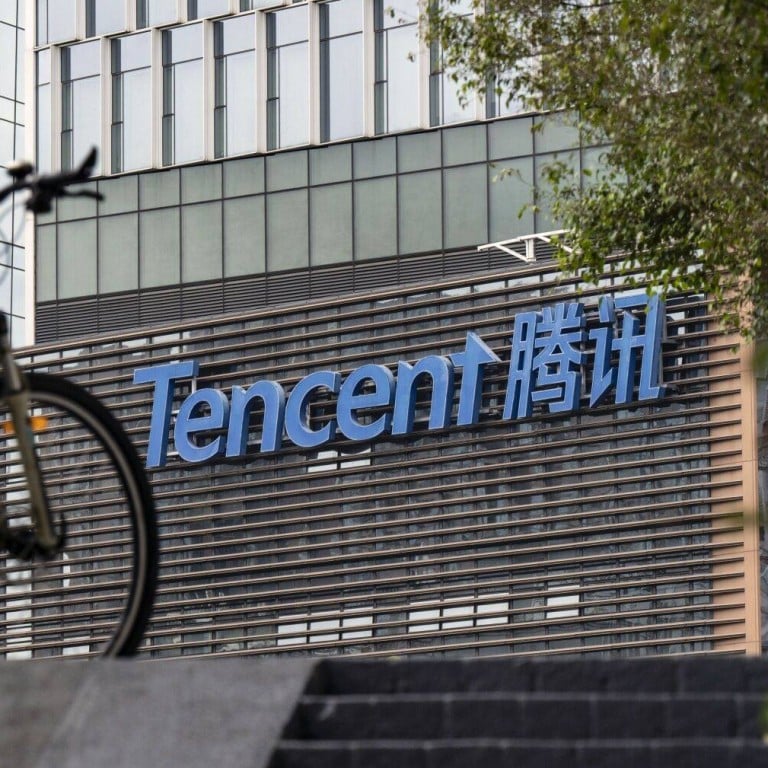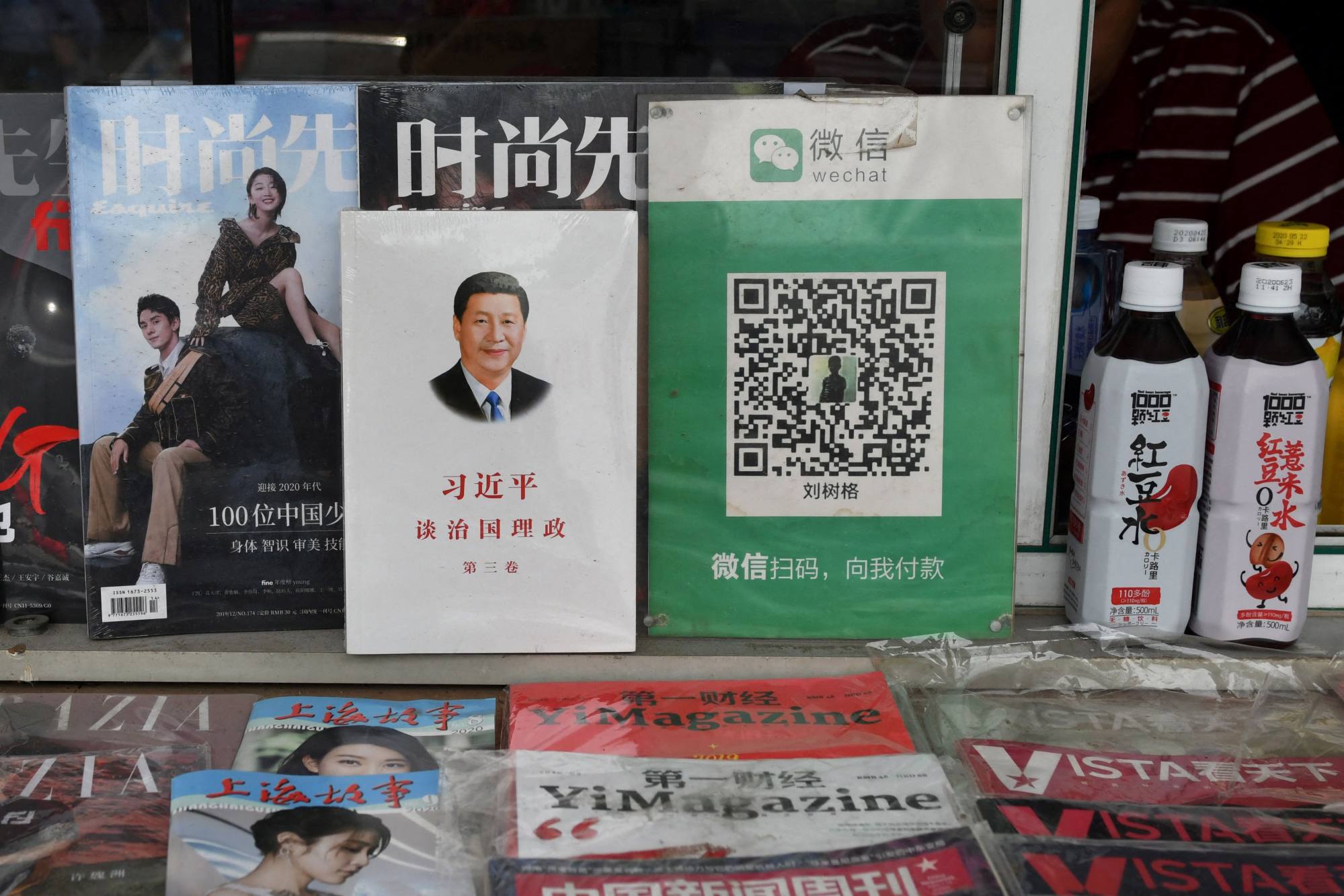
Tencent doubles share buy-backs while annual and quarterly results miss estimates amid weaker video gaming sales
- Tencent says it intends to double the size of its share repurchases to more than HK$100 billion this year
- Domestic video game sales, traditionally Tencent’s strongest revenue driver, declined in the fourth quarter
The Hong Kong-listed company saw revenue in the three months ended December 31 rise 7 per cent from a year earlier to 155.2 billion yuan (US$21.5 billion). It missed the consensus estimate of 157.4 billion yuan, according to analysts polled by Bloomberg.
Net income in the period was 27 billion yuan, down 75 per cent due to a high base from gains from the disposal of Meituan shares a year earlier. That was still below the average analysts’ forecast of 33.29 billion yuan.
For the full year, Tencent posted net income of 115.2 billion yuan, down 39 per cent from 2022 and missing expectations of 123.5 billion yuan. Annual revenue grew 10 per cent to 609 billion yuan, slightly below analysts’ estimates of 612.7 billion yuan.
The Shenzhen-based company proposed the payment of a final dividend of HK$3.4 per share for 2023, up 42 per cent from 2022. It said it intends to at least double the size of its share repurchases from HK$49 billion in 2023 to over HK$100 billion this year.

Video game sales, traditionally Tencent’s strongest revenue driver, declined 3 per cent in the domestic market while rising 1 per cent overseas in the fourth quarter, reaching 27 billion yuan and 13.9 billion yuan, respectively.
The slump in the domestic market is due to decreased contributions from its flagship titles Honour of Kings and Peacekeeper Elite, the company said.
Quarterly revenue from Tencent’s value-added services, comprising the firm’s video gaming and social media businesses, came in at 69 billion yuan, down 2 per cent.
Tencent is navigating macroeconomic and regulatory uncertainties amid China’s slow post-pandemic recovery.
At an annual meeting in January, Tencent founder and chief executive Pony Ma Huateng urged employees at the 26-year-old company to search for new opportunities in its video gaming and social media operations, calling on WeChat to grow because “an old tree should put forth new buds”, and asking the gaming business to step up international expansion.
Tencent’s stock has fluctuated after the Chinese video gaming regulator proposed last December to restrict spending in games, triggering a market sell-off in the sector. Sentiment improved after mainland authorities withdrew the plan and approved more new video games than usual.
“The supportive signal by the regulators has been quite significant and obvious” after “misunderstanding” appeared in the market about the proposed regulations, said company president Martin Lau Chi-ping on a conference call with the media on Wednesday.
Tencent was granted a licence in January for a mobile game developed in collaboration with the NBA.

The regulatory outlook for China’s internet sector is expected to stabilise in 2024, with the since-retracted gaming rules in late 2023 unlikely to have a material impact on Tencent, according to a research note by Bloomberg Intelligence this week.
“Beijing remains broadly supportive of the internet sector … viewing Tencent and its peers as stalwarts of China’s economic growth,” analysts Robert Lea and Jasmine Lyu wrote.
But heightened competition in the video gaming sector could weigh on Tencent’s future growth, according to Shawn Yang, senior equity analyst at consultancy Arete Research.
“Tencent currently holds the largest gaming market share in China, [but] with batches of new games from various genres being introduced to the market, it remains to be seen whether these new additions will cannibalise the share of some of Tencent’s popular legacy games, such as Honour of Kings and Peacekeeper Elite,” Yang said.
Tencent’s recent acquisitions and investments are expected to facilitate the development of high-quality, domestically produced titles, according to Zhang Shule, gaming industry analyst at CBJ Think Tank.
“This will also enable the firm to introduce new titles that are on par with its popular Honour of Kings and Peacekeeper Elite,” Zhang said, adding the company is poised to become a prominent developer of premium games, in addition to being a top earner in the video gaming industry.

Tencent has also been boosting efforts in artificial intelligence (AI) along with its Chinese and global peers.
The company has been rapidly enhancing the ability of its AI models to create images and videos based on text prompts, according to company president Lau. The area is expected to become the next battleground for Chinese tech firms, after OpenAI unveiled its text-to-video tool Sora earlier this year.
Tencent’s self-developed Hunyuan model, which has been integrated into some of the company’s enterprise products, is being used by employees for daily tasks such as coding or content generation, according to Lau, in response to a Post question. The model has also been used to improve advertisements to increase clicks, he added.
During the fourth quarter, Tencent’s quarterly revenue from online advertising grew 21 per cent to 29.8 billion yuan, helped by recovery in demand from clients in internet, healthcare and other industries, as well as robust sales from Video Accounts, the short-video section within WeChat.
Tencent’s e-commerce drive takes off via WeChat’s short video function
User time spent on Video Accounts, marketed as Channels, more than doubled last year, according to Tencent.
“We are gradually building an e-commerce ecosystem based on live-streaming and video, and this ecosystem will also be a main driver for further monetisation of Video Accounts,” Lau said.
Fintech and business services were another bright spot for Tencent, with fourth-quarter revenue growing 15 per cent to 54.4 billion yuan.
Tencent’s shares closed at HK$288.8 on Wednesday ahead of the earnings announcement, up 1.33 per cent.


